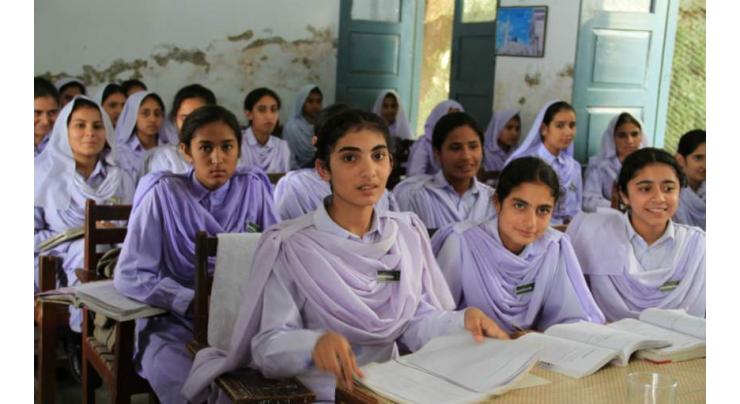
- Home
- Pakistan
- News
- National Internal Security Policy (NISP): Teacher training programme on preventing violent extremism ..
National Internal Security Policy (NISP): Teacher Training Programme On Preventing Violent Extremism In Classrooms To Be Designed
Rukhshan Mir (@rukhshanmir) Published June 13, 2018 | 01:25 PM

The government, under its National Internal Security Policy (NISP), will design and implement a teacher training programme on preventing violent extremism in classrooms and campuses.
ISLAMABAD, (UrduPoint / Pakistan Point News - 13th Jun, 2018 ) :The government, under its National Internal Security Policy (NISP), will design and implement a teacher training programme on preventing violent extremism in classrooms and campuses.
Teachers need to be trained on how to prevent growth of violent extremism under a programme which will be introduced in collaboration with provincial governments and development partners.
Highlighting reforms in education sector, the NISP-2018-23 document prepared by Ministry of Interior on Wednesday showed that efforts had been made in last five years to substantially improve provision of education in all federating units of the country and in particular, enrollments and retention rates had increased on an overall basis.
Much however, still needs to be done, especially with regards to education content and delivery, to build learners' resilience to violent extremism.
Some of the reforms will include that the government will continue to increase resource allocation on education to bring it at par with at least 4 per cent of Gross Domestic Product (GDP).
Additional funds will be used to bridge gap in standard of education between public and private institutions.
Moreover, minimum national standards will also be set for Madaris, public and private education sectors.
The document further showed that curriculum reforms would be one of the most important components of education system reforms as across the board curriculum reform in both mainstream institutions and madaris will be initiated to bring it in conformity with the new national narrative proposed above.
In collaboration with provinces, curriculum guidelines and standards will be developed to ensure that textbooks are free of hate content, racial, gender and regional stereotypes/prejudices, and glorification of war and violence.
Content on modern concept of citizenship which stresses commonalities among all people, irrespective of their backgrounds, and which derives its values from basic fundamental rights enriched in the constitution, will be developed.
In this regard, a review of curriculum of Pakistan Study and Islamic studies shall be prioritized.
The subjects of social studies and civic education shall be introduced as mandatory subjects at high school and college level.
These subjects will help students develop a basic understanding of different religions and social issues before they embark on path of specialization in their respective fields.
Furthermore, child safety education will be mandated at all schools to prevent child abuse and bullying while inter-province teacher and student exchange programmes will be introduced to promote social cohesion and harmony.
Access to education will be improved in rural areas and deprived regions of the country. In militancy-affected areas like tribal areas, physical infrastructure of schools destroyed by militants shall be laid.
Girls education shall be prioritized too, especially in areas where militants have threatened girls attending schools.
Career and general counselling units shall be created at all educational institutions to provide much-needed guidance and mentorship to students.
Debating societies will be established at educational institutions to help students develop critical thinking skills and reconcile difference of opinion.
The ultimate purpose of such activities will be creation of safe spaces for students at university campuses.
Higher Education Commission (HEC) will devise guidelines for implementation of interventions that fall in their domain.
Furthermore, it will he mandated with ensuring continuedimprovements in quality of research increasing number of worldclassresearch institutions in the country. aa
Related Topics
Recent Stories

SC orders end of encroachments in Karachi

Nazish Jahangir denies viral screenshots, calls them fake

Govt likely to hike electricity price once again

Bismah Maroof announces immediate retirement from international cricket

Malala expresses unwavering support for Gaza people

Selection committee dissolved over Pakistan women cricket team's poor performanc ..

Punjab CM Maryam Nawaz in police uniform at Chung police center

Currency Rate In Pakistan - Dollar, Euro, Pound, Riyal Rates On 25 April 2024

Today Gold Rate in Pakistan 25 April 2024

Mired in crisis, Boeing reports another loss

Session Awarding Ceremony 2024 held at Cadet College Muzaffarabad

Austrian ski great Hirscher to make comeback under Dutch flag
More Stories From Pakistan
-
Family of slain police officer demands justice
6 minutes ago -
Abdul Wasay, Faisal Wawda take oath as Senators
7 minutes ago -
Colorful event inaugurated at KUST
16 minutes ago -
Balochistan suitable region for int’l investment, govt to provide all facilities under one-window ..
16 minutes ago -
Lahore Police adopt foolproof security for Pakistan-New Zealand T20 cricket series
16 minutes ago -
DIG IT appointed as Commandant SSU, CPEC
16 minutes ago
-
Partly cloudy weather forecast for city
16 minutes ago -
Meta delegation calls on Shaza Fatima
16 minutes ago -
SMC officers from NIM receive briefing on BISP operations
26 minutes ago -
DG kicks off tree plantation drive in ICT
26 minutes ago -
Wafaqi Mohtasib team directs ETO to provide one-window facility, launch awareness campaign
26 minutes ago -
PML-N MPA visits PBM district office, gets briefing on projects
26 minutes ago